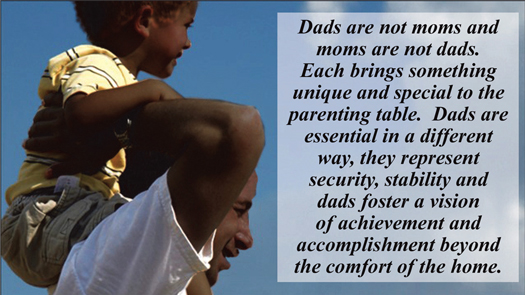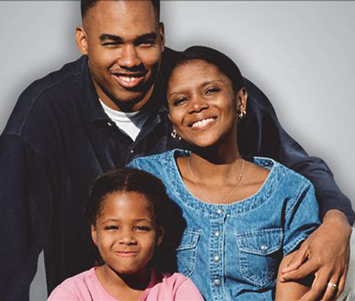Fathers at forefront, taking leading roles in child rearing
By Nisa Islam Muhammad -Staff Writer- | Last updated: Dec 1, 2017 - 12:59:51 PMWhat's your opinion on this article?

|
When wedded bliss started to become a family feud between Brian and Halimah Jenkins, his first thought was their four sons needed to be with him.
“This decision was all about my boys and what would be best for them,” Mr. Jenkins told The Final Call. “I am the best person to take care of them. I’m the best person to help them become well adjusted, socially conscious young Black men. Why? Because I’ve been there, done that. I know what it’s like and can help them navigate the challenges they face living in America,” he explained.
“It was harder for Halimah dealing with the peer pressure of family and friends who automatically think children should be with their mothers. We talked long and hard. It wasn’t an easy decision but it was the best decision for our sons. She sees them and spends lots of time with them but I am their primary caretaker,” Mr. Jenkins continued.
Mr. Jenkins is one of the growing numbers of dads who are stepping up to raise their children as the primary caretaker. The reasons vary why dads become the primary custodial parent but the U.S. Census Bureau’s 2017 America’s Families and Living Arrangements table package released Nov. 16, found that the percentage of children living with one parent who live with just their father saw an increase from 12.5 percent in 2007 to 16.1 percent in 2017.

|
“A higher percentage of children living with one parent live with their fathers than a decade ago,” said Rose Kreider, a demographer in the Fertility and Family Statistics Branch at the Census Bureau. “However, the majority of children living with one parent still live with their mothers.”
In 2017, 83.9 percent of children living with one parent lived with their mother, compared to 86.0 percent in 2012 and 87.5 percent in 2007.
“I thought about what it would be like as a single mom with four sons,” Halimah Jenkins told The Final Call. “I have friends who do it and make it look easy but I know how hard it can be. My mom was a single parent. I just didn’t want to do it. So when Brian suggested that the boys live with him, my family was more upset about that than me,” she explained.
“They were used to moms having custody and making the man’s life miserable, custody fights, child support wars and so much more. I wanted no parts of any of that. Brian is a great dad and I support that. We are still a family but the romance is gone between us. Our boys are our first priority and this works.”
The effects of so-called “fatherless children” have been well documented. According to Fathers, Inc. fatherless boys and girls are twice as likely to dropout of high school; twice as likely to end up in jail and four times more likely to need help for emotional or behavioral problems.
“These new statistics legitimize the narrative I’ve been talking about even blogging about. Black men have been in the lives of our children. We’re not talking about something new. This helps to define how we speak about men from a positive model. A lot of dads are doing the right thing but we have struggles with racism, oppression and more,” Kenneth Braswell, executive director of Father’s Inc., told The Final Call.
“Seventy-three percent of Black children are in single parent households. That doesn’t mean 73 percent of Black children are without their dad. Researchers are finally measuring how fathers are involved in the lives of their children. Where do Black fathers fit in this data? We need more research on that. Census data has found that Black men are the most engaged men in the lives of their children. More than White dads, Latino dads or any other dads, Black dads are the most engaged with their children,” said Mr. Braswell.

|
For many Black dads who want custody of their children, facing what they see as a prejudiced court system that rules in favor of moms is their greatest hurdle in addition to the racism that is also a reality.
Carl Willis found out too late to prevent his daughter from going to foster care. Her mom’s life was falling apart and social services decided it was best to put Mia in a foster home. As soon as Mr. Willis found out Mia was in a foster home, he tried to get custody of her.
“It was one hurdle after another. She spent 18 months in foster care and I finally got her out. It was a chance to prove myself in light of all the men subjected to unjust court rulings,” Mr. Willis told The Final Call. “I knew I could do it. I was challenged to rise to another level to care for my daughter.”
“My only problem was doing her hair. I had a friend who worked in beauty salons who would do her hair. I was doing this to show in spite of the unjust rulings men face in court, we can care for our children. Things are so one-sided in the courts against men.”
Mia’s mom got her life together and went back to live with her.
“I, then, went back to just being a money machine, my role was just about giving child support even though I demonstrated for over a year the ability to care for Mia,” Mr. Willis said.
Mr. Braswell explained that what society expects of parents is often unequal and biased. Understanding what societal parental engagement looks like doesn’t always equal societal parental finances as if that is the only thing a man can contribute to a child.
“We know that in a married family, if the dad stays home to care for the children, his daily contributions, though not financial, are seen as equal to the working mom’s contributions. We need a narrative that speaks to how we support fathers and mothers regardless of the position they are in,” said Mr. Braswell.
Dads are not moms and moms are not dads. Each brings something unique and special to the parenting table, analysts note.
“Dads are essential in a different way, they represent security, stability and dads foster a vision of achievement and accomplishment beyond the comfort of the home. Moms make home a refuge and comfort. Dads, because they work and secure material benefit, help children negotiate their relationship with the world beyond the home,” Jamil Muhammad, Program Director of the Wedded Bliss Foundation told The Final Call.
“Dads, regardless of the relationship status with their moms, love their children and want to be seen as more than just a walking ATM. When the relationship between mom and dad is harmonious, both parents are able to express the full flower of their respective duties,” said Mr. Muhammad.

Dr. Kevin Washington
|
He sees up close and in person, the challenges parents face in taking care of their children and the struggles men have in assuming their roles.
“Fathers play an instrumental role in the life of their children. Moms play a role in the academic success of their children and fathers play a role in the lifetime success of their children. Fathers tend to teach life lessons and emotional stability. They also teach safety and well being,” said Dr. Washington.
“Children who have their fathers involved in their lives are more physically active. Playtime with dads is different than playtime with moms. With toddlers, it’s more rough and tumble while with mothers it’s more nurturing. Fathers play focuses on physical and motor development like riding a bike and learning to drive a car which also leads to intellectual stimulation. All of this counters the narrative seen in racial socialization of men,” he continued.
According to Census data nearly 20 million children under age 18 live with one parent, composing 27.1 percent of all living arrangements for children under age 18. In 2007, 25.8 percent of children under age 18 lived with one parent, and in 2012, one of the highest intervening years, 28.3 percent of children under age 18 lived with one parent.
Of children who live with one parent, the most common marital status of the mother is never married (49 percent). The most common marital status of the father is divorced (43 percent). For children who live with their mother only, the largest proportions are ages 6 to 11 (36 percent), and ages 12 to 17 (35 percent).
For children who live with their father only, the largest segment are ages 12 to 17 (43 percent), followed by ages 6 to 11 (31 percent).
“The age distribution of children under age 18 who live with one parent shows a higher proportion of children living with their mother only are younger than children living with their father only,” Mrs. Kreider said.
INSIDE STORIES AND REVIEWS
-
-
About Harriett ... and the Negro Hollywood Road Show
By Rabiah Muhammad, Guest Columnist » Full Story -
Skepticism greets Jay-Z, NFL talk of inspiring change
By Bryan 18X Crawford and Richard B. Muhammad The Final Call Newspaper @TheFinalCall » Full Story -
The painful problem of Black girls and suicide
By Charlene Muhammad -National Correspondent- » Full Story -
Exploitation of Innocence - Report: Perceptions, policies hurting Black girls
By Charlene Muhammad -National Correspondent- » Full Story -
Big Ballin: Big ideas fuel a father’s Big Baller Brand and brash business sense
By Bryan Crawford -Contributing Writer- » Full Story






 Click Here Stay Connected!
Click Here Stay Connected!








